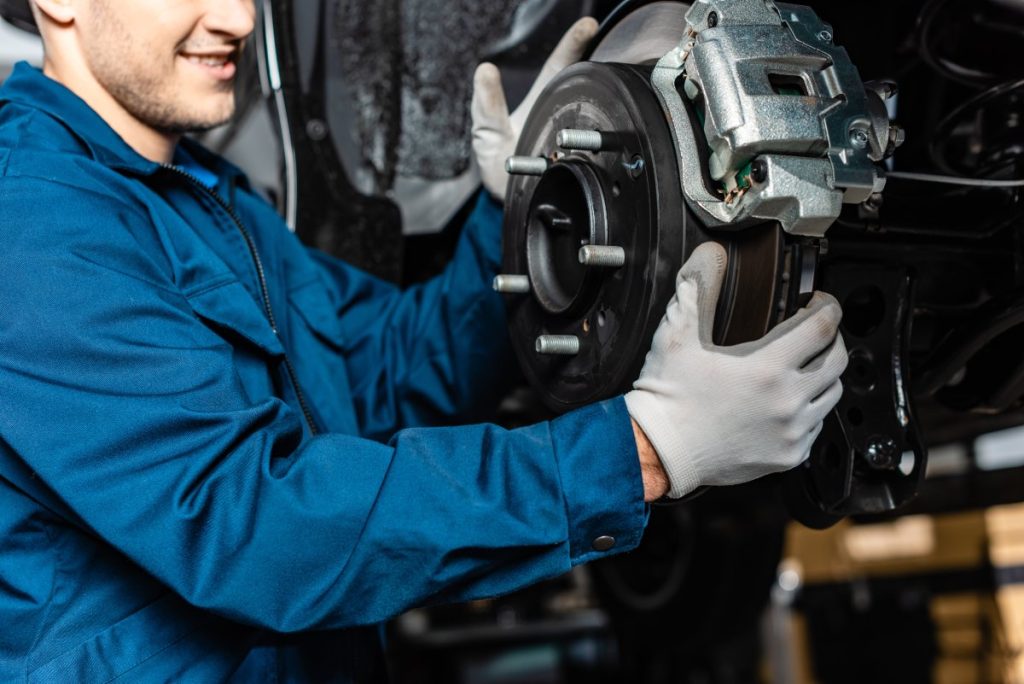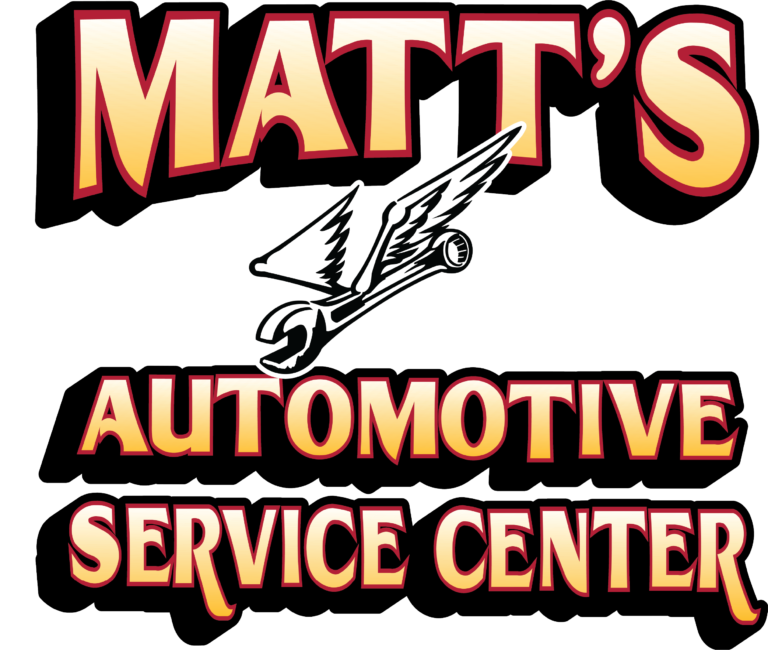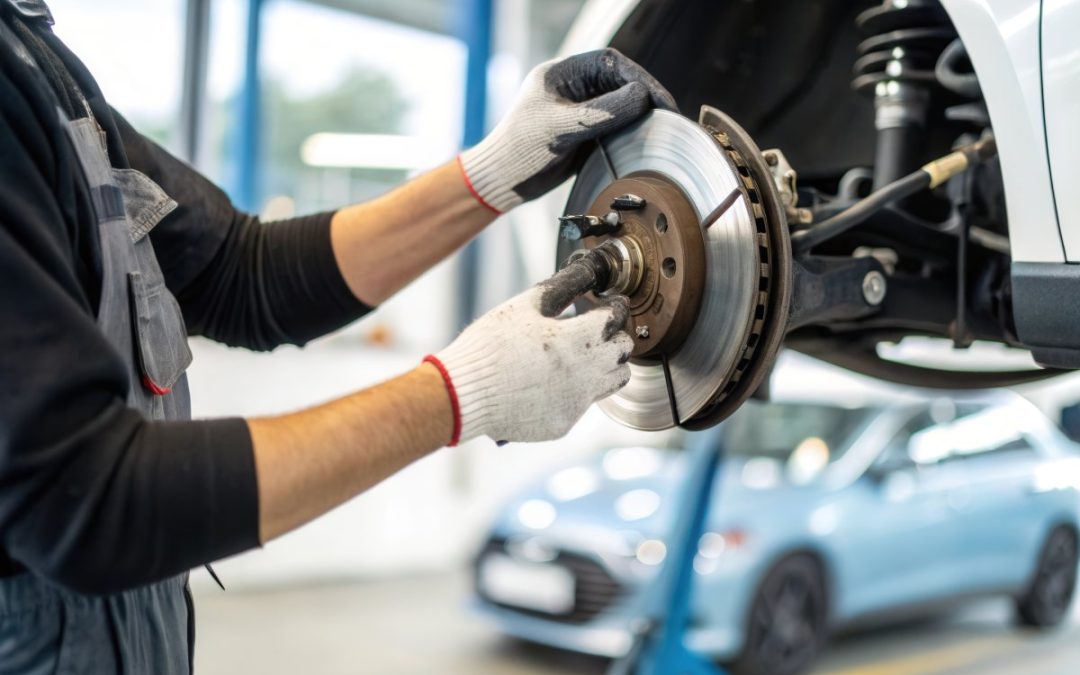Home » Stop Safely: Why Timely Brake Repair is Crucial for Every Driver
- The Role of Brakes in Road Safety
- Warning Signs That Your Brakes Need Attention
- Common Causes of Brake Problems
- The Risks of Ignoring Brake Repairs
- Brake System Components Every Driver Should Know
- How Regular Inspections Prevent Costly Damage
- The Connection Between Brake Health and Vehicle Performance
- When to Schedule a Brake Repair Appointment
- Conclusion: Prioritize Brake Repair for a Safer Drive
- Frequently Asked Questions
- Why is timely brake repair important for my vehicle’s safety?
- What are the warning signs that my brakes need repair?
- How often should I have my brakes inspected or replaced?
- What causes brakes to wear out or fail?
- What happens if I ignore brake repair or maintenance?
- Why choose Matt’s Automotive Service Center for brake repair?
- Fargo Brake Repair
- Moorhead Brake Repair

As drivers, we often take for granted the most critical safety feature in our vehicles: the brakes. They’re what allow you to slow down, navigate stop-and-go traffic, and, most importantly, react quickly to an unexpected hazard. When you press that pedal, you need to know your car will respond perfectly, every single time. That absolute trust in your stopping power is why timely brake repair isn’t just a suggestion—it’s essential for the safety of everyone on the road.
At Matt’s Automotive Service Center, a family-owned and operated business with 10 convenient locations across the Fargo-Moorhead and Minneapolis-St. Paul’s areas of Minnesota and North Dakota, we understand this better than anyone. We’ve built our business on the unwavering trust of our valued customers, and that starts with making sure your vehicle is as safe as possible. We’re more than just a typical auto repair shop; our goal is to set a new benchmark in the industry by providing the kind of dedicated care your safety deserves, offering expert brake repair service you can always count on.
The Role of Brakes in Road Safety
Your brakes are the most important part of your vehicle’s safety system. They are the single component that converts your vehicle’s motion into controlled stopping. Without fully functional brakes, you lose the ability to manage your speed and, in an emergency, avoid a collision.
The whole braking process is an incredible piece of engineering. When you step on the brake pedal, you’re initiating a chain reaction that uses a special hydraulic fluid to multiply the force of your foot. This force ultimately pushes the brake pads against the spinning rotors or drums, creating friction that slows your wheels.
If any part of this crucial system is worn down, damaged, or leaking, your stopping distance increases, and the risk of an accident goes way up. The reality is, your ability to stop safely—in a controlled, predictable distance—is directly tied to the health of your braking system. This makes a regular brake inspection a non-negotiable part of responsible vehicle ownership.
Warning Signs That Your Brakes Need Attention
The good news is that your vehicle usually gives you clear warnings when it needs a professional brake check. Paying attention to these subtle (and not-so-subtle) cues is the first step toward preventing a major problem and ensuring you get the necessary auto brake repair shop service. Ignoring these signs of brake failure is dangerous and can turn a simple fix into a very costly one.
Look (and listen) out for these common red flags:
- Squealing or Squeaking Noises: This is often the first sign of trouble. Many brake pads have a small metal indicator, or “wear indicator,” that creates a high-pitched sound when the pads have worn thin. This noise is literally a built-in alarm telling you it’s time for a brake pad replacement.
- Grinding Sound: If the squealing has stopped and you now hear a loud, harsh grinding, your brake pads are likely completely worn away. This means you have metal-on-metal contact (the rotor scraping against the caliper), which is dangerous and quickly damages the rotors, leading to a much more expensive repair. This is a clear sign to get to your trusted mechanic immediately.
- A Spongy or Soft Brake Pedal: Does your pedal sink to the floor or feel mushy when you press it? This is often a sign of a problem with your hydraulic system, such as low brake fluid, a leak in the brake lines, or air trapped in the system. This can lead to a complete loss of braking ability.
- Vibrations or Pulsations: If the brake pedal or steering wheel shakes or vibrates when you brake, it likely means your rotors are warped. Warped rotors are usually caused by excessive heat and wear, which prevents the brake pad from making even contact, compromising your stopping power.
- Your Car Pulls to One Side: If your vehicle veers right or left when you apply the brakes, it could be a sign of a stuck caliper or unevenly worn brake pads. This creates an imbalance that makes safe stopping difficult, especially at higher speeds.
- The Brake Warning Light is On: Modern vehicles have a light dedicated to the braking system. If it illuminates (and your parking brake isn’t engaged), it’s a non-negotiable sign that you need a professional brake inspection.
Common Causes of Brake Problems
Understanding the things that cause your brakes to fail can help you recognize the issue quickly and even change your driving habits to extend the life of your brake system.
Excessive Wear And Tear
The most common culprit is simply excessive wear and tear. Brakes are a friction-based system, which means they are designed to wear out over time. Your driving style plays a huge role in how often to replace brakes. Frequent, hard braking, often seen in heavy city or stop-and-go traffic, generates more heat and wears down pads and rotors much faster than mostly highway driving.
Brakes Overheating
Another major issue is overheating. Brakes get hot, but when they get too hot, the pads can suffer from a condition called “glazing,” where the friction material hardens and becomes smooth, losing its grip. Rotors can also warp from excessive heat, as mentioned earlier.
Low Brake Fluid
Finally, problems with brake fluid are common. Brake fluid is hygroscopic, meaning it naturally absorbs moisture from the air over time. This water lowers the fluid’s boiling point, leading to ‘brake fade’ when the fluid boils under heavy braking. Leaks in the system, due to worn brake lines or faulty components, will also drop the fluid level, which can lead to catastrophic brake failure. This is why brake system maintenance includes checking and sometimes flushing the brake fluid.
The Risks of Ignoring Brake Repairs
Delaying a necessary brake service might save you a little money now, but it’s a dangerous gamble that carries severe risks, both for your wallet and your safety.
Reduced Stopping Power
The primary and most significant risk is reduced stopping power, which increases your stopping distance and dramatically raises the probability of an accident. Even a few extra feet needed to stop can be the difference between avoiding a rear-end collision or causing a major pile-up.
More Expensive Repairs
Beyond safety, ignoring warning signs leads to much more expensive repairs. For example, if you catch a worn brake pad early, you only need a relatively inexpensive brake pad replacement. If you ignore the grinding noise, you risk complete wear-through, which damages the metal rotor.
Now, instead of just replacing pads, you need to replace or resurface the rotors as well. This metal-on-metal contact can also damage the brake calipers, turning a standard brake job into a full system overhaul costing hundreds more.
The bottom line is simple: the importance of timely brake repair cannot be overstated. By addressing a minor issue now, you prevent a major crisis later.
Brake System Components Every Driver Should Know
To better understand your vehicle’s needs, it helps to know the key parts that make up your braking system.
- Brake Pads: These are the friction material that presses against the rotor or drum to slow the wheel. They are designed to be replaced regularly.
- Brake Rotors (or Drums): The rotors are the shiny, circular discs (or drums) that rotate with your wheel. The brake pads clamp onto the rotors to create the friction needed to stop. They can warp or wear down and sometimes need to be resurfaced or replaced.
- Brake Calipers: The calipers house the brake pads and act like a clamp. They are the component that pushes the pads onto the rotors when you step on the pedal.
- Brake Fluid: This is the hydraulic fluid that transfers the force from your brake pedal to the calipers. Its condition and level are vital to your braking power.
- Master Cylinder and Brake Lines: The master cylinder is where the brake fluid is pressurized. The brake lines are the tubes that carry the high-pressure fluid to the calipers at each wheel.
Our certified brake repair technicians at Matt’s Automotive Service Center are experts in every one of these components, ensuring a complete and professional service every time.
How Regular Inspections Prevent Costly Damage
A routine brake inspection allows a technician to catch thin pads, minor leaks, or uneven wear before they cause a breakdown or costly damage to other parts of the system, such as the rotors and calipers.
At Matt’s Automotive, we recommend having your brakes checked at least once a year, or whenever you notice one of the warning signs. These inspections are comprehensive, including checking the brake pad thickness, looking for warps or grooves on the rotors, checking the condition and level of the brake fluid, and making sure the calipers are moving freely. This proactive approach saves you money and, more importantly, keeps you safe.
The Connection Between Brake Health and Vehicle Performance
Brake health affects more than just your ability to stop—it also impacts your vehicle’s overall performance. Healthy brakes provide a better, more responsive driving experience. When a caliper is stuck, for example, it can cause the brake pad to constantly drag against the rotor. This creates unnecessary friction, leading to decreased fuel efficiency, excessive heat, and premature wear on your tires. Properly working brakes also ensure consistent and balanced stopping, which improves overall vehicle control and stability, making your ride smoother and safer in all driving conditions.
When to Schedule a Brake Repair Appointment
You should schedule an appointment with your auto repair shop immediately if you notice any of the warning signs: grinding, a spongy pedal, or the brake light coming on.
For preventative maintenance, the answer to how often to replace brakes varies, but most experts recommend having your pads inspected every 12,000 to 15,000 miles. Brake pads themselves can last anywhere from 25,000 to 70,000 miles, depending heavily on your driving habits and environment.
Ultimately, don’t wait for a problem to force your hand. The moment you feel any difference in your braking performance, it’s time to call a professional for the best brake repair service in the Fargo-Moorhead and Minneapolis-St. Paul, trust the expertise of our growing team of dedicated auto mechanics at Matt’s Automotive Service Center. We are the car repair and brake specialists committed to your peace of mind.
Conclusion: Prioritize Brake Repair for a Safer Drive
Your vehicle is a significant investment, but more importantly, it carries you and your loved ones every day. The safety of that journey rests squarely on the health of your brakes. Ignoring the need for a brake repair is a gamble no driver should take.
At Matt’s Automotive Service Center, we’re dedicated to being your trusted brake repair mechanic, raising the bar for service and excellence across all our 10 locations. We believe in being transparent, honest, and completely committed to your safety. If you’ve noticed any warning signs or if it’s just time for a checkup, schedule your brake inspection today.
Contact us at 701-478-3838, or reach our Facebook page. Let our certified brake repair technicians ensure your vehicle is ready to stop safely, giving you the confidence you deserve every time you get behind the wheel. Don’t wait—prioritize your brake repair for a safer drive.
Frequently Asked Questions
Why is timely brake repair important for my vehicle’s safety?
Timely brake repair ensures your car can stop effectively in any situation, preventing accidents and costly damage. It also keeps your vehicle’s braking system in peak condition for reliable performance.
What are the warning signs that my brakes need repair?
Common signs include squealing or grinding noises, a soft brake pedal, vibration when braking, or your vehicle pulling to one side. If your brake warning light turns on, it’s time for an inspection.
How often should I have my brakes inspected or replaced?
Experts recommend a brake inspection every 12,000 to 15,000 miles. Brake pads typically last between 25,000 and 70,000 miles, depending on your driving style and conditions.
What causes brakes to wear out or fail?
Brake wear is mainly caused by friction, heat, and fluid issues. Frequent hard braking, overheating, and low or contaminated brake fluid can all lead to premature brake failure.
What happens if I ignore brake repair or maintenance?
Ignoring brake issues increases stopping distance, raises accident risk, and leads to expensive repairs. Worn pads can damage rotors and calipers, turning a small fix into a major overhaul.
Why choose Matt’s Automotive Service Center for brake repair?
Matt’s Automotive provides expert brake repair across 10 convenient locations in Minnesota and North Dakota. Our certified technicians deliver transparent, honest service focused on your safety and peace of mind.


Recent Comments